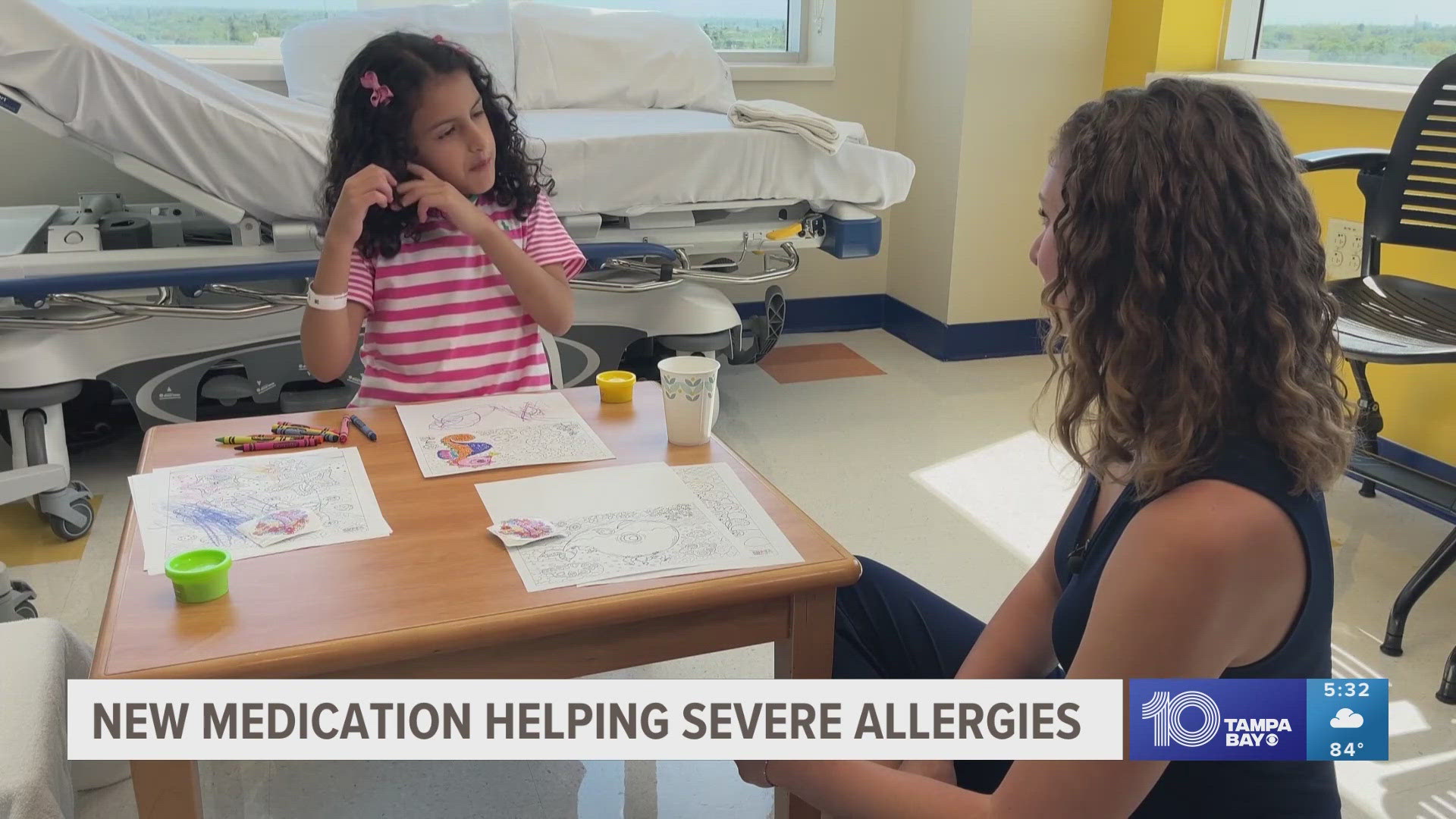ST. PETERSBURG, Fla. — In November, the Alabsi family went to spend a family fun day at the zoo in Tampa. The day ended in the emergency department as 8-year-old Layan's eyes swelled shut and her airways closed.
Hamam and Dania, Layan's parents are used to packing dairy-free snacks, disinfectant wipes and an EpiPen with them every time they leave the house. Layan is severely allergic to dairy.
At this zoo visit, Layan found a vending machine that offered food products she could safely eat. Well, you can't get one child a sweet treat without doing the same for the other. Layan's parents bought 3-year-old Yasmeen a regular, dairy ice cream.
It took a split second for their day to turn into complete panic.
"She just touched this spoon in her mouth and said it doesn't taste right," Layan's father shared. "And shortly after her eyes started to be red, puffy, swollen."
Hamam Alabsi has a medical background and is trained on what to do in situations exactly like this. But when it's your own kid who is the patient, all that training can be difficult to remember.
"She wasn't able to breathe," Hamam said. "She was barely awake. I called 911. I ended up giving her an EpiPen. And she could have passed that day."
Layan was stabilized by the time the ambulance arrived. Just the thought of what could have happened was devastating to her parents.
"When I saw her awake, talking, I just cried like a baby," Hamam shared.
If you ask Layan about that day at the zoo, she has a much more lighthearted description.
"Well, when I ate something I couldn't even breathe and I had to call 911. And yeah, almost died," she said nonchalantly while coloring with some crayons.
It's not just day trips to parks that impact the Alabsi family. It's every day. Layan has to eat lunch at a table by herself at school to ensure she does not come into contact with dairy.
"Yeah, that's the worst part," Layan said. "Yep. All by myself, which is so boring."
She also doesn't go to birthday parties, or get to feel included in the normal social activities of an 8-year-old.
Now, with the FDA approval of Xolair to treat patients with severe food allergies, there's hope.
The drug has been approved for treatment of asthma. Now, following a new study on patients with peanut and other food allergies, researchers found after 16 weeks, 66.9% of patients treated with Xolair were able to tolerate 600 milligrams or more of peanut protein — equal to about 2.5 peanuts, compared with 6.8% of participants who received placebo injections.
The researchers also found that Xolair injections increased participants’ threshold reactivity not just to peanuts but to other common food allergens — milk, eggs, wheat, cashews, walnuts, and hazelnuts — to levels that would protect most patients from reactions after accidental exposure.
Dr. Panida Sriaroon is the medical director of Johns Hopkins All Children's Hospital Food Allergy Clinic. She has been treating Layan with a desensitization regimen, and now, with Xolair.
"So the gold standard of food allergy treatment is to do strict avoidance and carrying injectable epinephrine," Sriaroon explained. "However, it is becoming difficult because now we have more people more kids with food allergies, and not just one food but several more foods. So it is become very challenging, is becoming very challenging to the restaurants to schools, to caregivers."
What does this new drug mean for patients like Layan?
"This is also not a treatment to treat acute anaphylaxis," Sriroon said. "So the goal of treatment is to increase the tolerance threshold."
If the treatment goes as planned, maybe she can take a bite of cake without her airways closing. That's all her parents want, a sense of normalcy for their daughter.
"Live her life as a normal child — to go to her best friend's birthday party, not be isolated in the school, can play with her friends as a normal child," Dania, Layan's mom said. "Be happy."
Layan receives a shot once every four weeks at Johns Hopkins All Children's Hospital in St. Pete. So far, she has received two shots and is observed for two hours after each dose to ensure she does not have a bad reaction. Her doctor said she took the treatment well.
Malique Rankin is a general assignment reporter with 10 Tampa Bay. You can email her story ideas at mrankin@10tampabay.com and follow her Facebook, Twitter, and Instagram pages.

